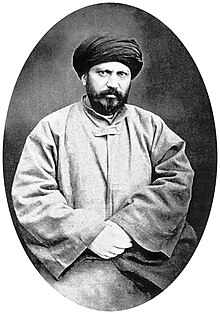Seyyed Jamaleddin Asadabadi
| Sayyid Jamāl al-Dīn al-Afghānī | |
|---|---|
 |
|
| Born |
Sayyid Jamaluddin ibn Safdar 1254 AH/ 1839 Location disputed |
| Died | 9 March 1897 (aged 58) Constantinople, Ottoman Empire |
| Cause of death | Cancer of the jaw |
| Resting place | Kabul, Afghanistan |
| Nationality | Disputed |
| Religion | Islam |
| Creed | Disputed |
| Notable idea(s) | Pan-Islamism |
|
Influenced
|
|
Sayyid Jamāl al-Dīn al-Afghānī (Persian: سید جمالالدین افغانی), also known as Sayyid Jamāl ad-Dīn Asadābādī (Persian: سید جمالالدین اسدآبادی) and commonly known as Al-Afghani (1838/1839 – 9 March 1897), was a political activist and Islamic ideologist in the Muslim world during the late 19th century, particularly in the Middle East, South Asia and Europe. One of the founders of Islamic Modernism and an advocate of Pan-Islamic unity, he has been described as being less interested in minor differences in Islamic jurisprudence than he was in organizing a Muslim response to Western pressure.
As indicated by his nisba, al-Afghani claimed to be of Afghan origin. His true national and sectarian background have been a subject of controversy. According to one theory and his own account, he was born in Asadābād, near Kabul, in Afghanistan. Another theory, championed by Nikki R. Keddie and accepted by a number of modern scholars, holds that he was born and raised in a Shia family in Asadabad, near Hamadan, in Iran. Supporters of the latter theory view his claim to an Afghan origin as motivated by a desire to gain influence among Sunni Muslims or escape oppression by the Iranian ruler Nāṣer ud-Dīn Shāh. One of his main rivals, the sheikh Abū l-Hudā, called him Mutaʾafghin ("the one who claims to be Afghan") and tried to expose his Shia roots. Keddie also asserts that al-Afghānī used and practiced taqīa and ketmān, ideas more prevalent in the Iranian Shiʿite world.
He was educated first at home and then taken by his father for further education to Qazvin, to Tehran, and finally, while he was still a youth, to the Shi'a shrine cities in present-day Iraq (then-part of Ottoman Empire). It is thought that followers of Shia revivalist Shaikh Ahmad Ahsa'i had an influence on him. Other names adopted by Al-Afghani were al-Kābulī ("[the one] from Kabul") Asadabadi, Sadat-e Kunar ("Sayyids of Kunar") and Hussain. Especially in his writings published in Afghanistan, he also used the pseudonym ar-Rūmī ("the Roman" or "the Anatolian").
...
Wikipedia
